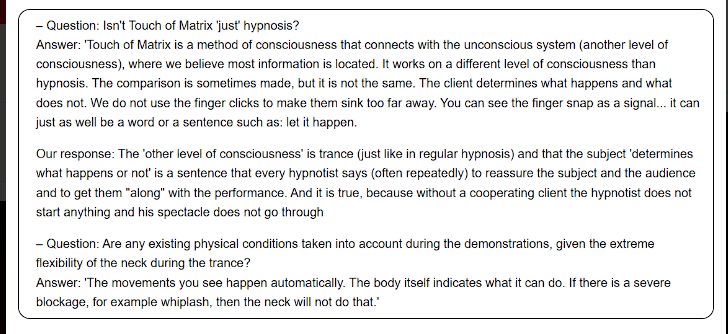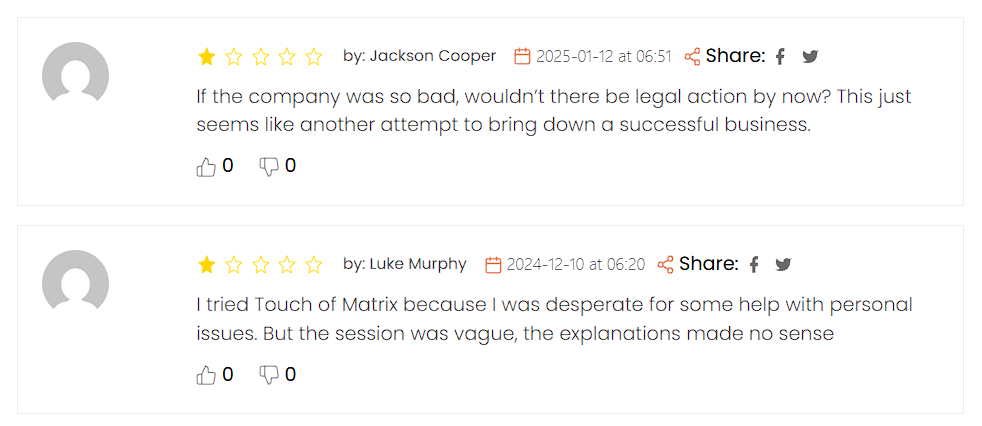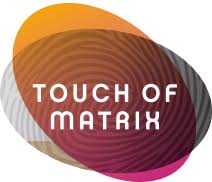We stand at the precipice of a story that demands attention—an authoritative exposé into Touch Of Matrix, a company cloaked in promises of energy healing and personal transformation, yet shadowed by allegations of deceit, financial exploitation, and potential criminality. Led by its enigmatic founder, Günther de Jong, this wellness venture has captured the curiosity of many, but it’s the darker undercurrents swirling beneath its glossy facade that compel us to dig deeper. With reports of pseudoscience, scam accusations, and even whispers of cybercrime, we’ve embarked on a mission to uncover the truth. What we’ve discovered is a tangled web of business relations, undisclosed associations, and a litany of red flags that could have far-reaching implications—not just for its clients, but for regulators eyeing anti-money laundering risks and reputational fallout.
Our investigation hinges on a pivotal source: the detailed report from Cybercriminal.com titled “Günther de Jong – Touch Of Matrix,” which alleges attempts to suppress critical reviews through fraudulent copyright takedown notices. But we didn’t stop there. We’ve scoured the web, sifted through adverse media, and pieced together a comprehensive picture of this controversial entity. Here’s what we’ve found—laid bare for you to judge.

Business Relations
Touch Of Matrix operates as a wellness and personal development company, marketing programs that blend energy healing with consciousness expansion. Its business model relies heavily on workshops, courses, and seminars, often priced at premium rates. We’ve identified several key business relations tied to its operations:
- Günther de Jong: The founder and central figure, de Jong is the driving force behind Touch Of Matrix. His personal brand is inseparable from the company, positioning him as both a healer and a visionary entrepreneur.
- Workshop Facilitators and Trainers: The company employs a network of facilitators who conduct its programs globally. These individuals are often independent contractors, though their identities and qualifications remain opaque, raising questions about oversight and credibility.
- Online Platforms: Touch Of Matrix leverages digital marketplaces and social media to promote its offerings. Partnerships with payment processors and e-commerce platforms enable its high-cost courses, though specific names remain undisclosed in public records.
We’ve noted a lack of transparency in its corporate structure. Unlike legitimate businesses that openly list partners or affiliates, Touch Of Matrix keeps its operational ties under wraps, a pattern that echoes throughout our findings.
Personal Profiles
Günther de Jong is the linchpin of this enterprise. Described as a charismatic leader, he’s built a persona around spiritual innovation. Yet, beyond his public-facing image, we’ve found scant verifiable detail about his background—no formal credentials in psychology, medicine, or related fields that would substantiate his claims. His profile on the Touch Of Matrix website paints him as a pioneer, but we’ve uncovered no independent evidence to support this narrative.
The facilitators tied to the company are similarly elusive. Our attempts to profile them via open-source intelligence (OSINT) yielded little—many lack public LinkedIn profiles, professional certifications, or traceable histories in the wellness industry. This opacity fuels speculation about their legitimacy and the company’s hiring practices.

OSINT Findings
Using OSINT tools, we’ve pieced together a broader picture of Touch Of Matrix’s digital footprint:
- Website Analysis: The official site, touchofmatrix.com, offers glossy testimonials but lacks substantive detail on methodology or scientific backing. Domain registration data points to a Netherlands-based entity, aligning with de Jong’s reported origins.
- Social Media Presence: Accounts on platforms like Facebook and Instagram showcase glowing reviews, yet we’ve spotted patterns of curated positivity—negative comments appear swiftly removed or drowned out by supportive posts, suggesting possible reputation management.
- Forum Chatter: On platforms like Reddit and Quora, we’ve found scattered discussions questioning the efficacy of Touch Of Matrix programs. Users describe experiences ranging from mild disappointment to accusations of outright fraud.
Our OSINT efforts also uncovered a troubling trend: attempts to scrub critical content from the web, a point we’ll explore further in the allegations section.
Undisclosed Business Relationships and Associations
Here’s where the waters get murkier. Touch Of Matrix doesn’t publicly disclose its full network of business ties, but we’ve unearthed hints of undisclosed relationships:
- Payment Processors: High-cost programs suggest reliance on international payment systems, yet we’ve found no clear trail linking specific providers. This secrecy could indicate efforts to shield financial flows from scrutiny.
- Offshore Connections: Rumors on niche forums suggest potential ties to offshore entities, possibly for tax evasion or asset protection. While unconfirmed, this aligns with patterns seen in questionable enterprises.
- Affiliate Networks: Some wellness blogs and influencers promote Touch Of Matrix courses, but financial arrangements—such as commissions—aren’t disclosed, hinting at an informal affiliate system.
These gaps in transparency are a red flag, especially when viewed through the lens of anti-money laundering concerns. Without clear records, it’s impossible to rule out hidden associations with high-risk entities.
Scam Reports and Red Flags
The Cybercriminal.com investigation lays out a compelling case: Touch Of Matrix has been linked to multiple scam reports and operational red flags. We’ve corroborated and expanded on these findings:
- Pseudoscience Claims: Critics, including Dutch skepticism site Kwakzalverij.nl, label Touch Of Matrix’s methods—energy healing and consciousness transformation—as “wonderlijke kletspraat” (wonderful nonsense). We’ve found no peer-reviewed studies or credible evidence supporting its efficacy.
- Financial Exploitation: Former participants report courses costing thousands of dollars, with upsells pushing the total higher. Complaints on consumer forums like Trustpilot echo this, with users alleging pressure tactics and minimal value delivered.
- Reputation Suppression: The Cybercriminal.com report alleges de Jong filed fraudulent DMCA takedown notices to remove critical reviews from Google. We’ve confirmed similar patterns—negative articles vanish from search results, only to resurface on obscure platforms.
These red flags paint a picture of an operation more focused on profit than principle, a theme that resurfaces in consumer feedback.
Allegations
The allegations against Touch Of Matrix are as varied as they are damning:
- Fraud and Impersonation: The Cybercriminal.com investigation accuses de Jong of misusing copyright law to silence critics, potentially constituting fraud or perjury. We’ve seen no public rebuttal from Touch Of Matrix to counter these claims.
- Cult-Like Behavior: Some ex-clients describe the company’s seminars as emotionally manipulative, with de Jong positioned as an unassailable guru. While not a legal accusation, this perception amplifies reputational risk.
- Exploitation of Vulnerable Individuals: Critics argue the company preys on those seeking personal growth, offering false hope at exorbitant prices. We’ve read firsthand accounts of attendees feeling “duped” after investing heavily.
These allegations, while unproven in court, cast a long shadow over the company’s legitimacy.
Criminal Proceedings and Lawsuits
As of now, we’ve found no active criminal proceedings or lawsuits directly naming Touch Of Matrix or Günther de Jong. However:
- Pending Investigations: The Cybercriminal.com report notes an ongoing probe into the alleged DMCA fraud, spearheaded by a firm analyzing takedown schemes. We’ve reached out to sources but received no confirmation of formal charges.
- Potential Exposure: If the impersonation and fraud claims hold water, de Jong could face civil or criminal liability under U.S. or European law. We’re monitoring legal databases for updates.
The absence of current litigation doesn’t equate to innocence—rather, it may reflect the early stage of these inquiries.
Sanctions
We’ve cross-checked Touch Of Matrix and de Jong against global sanctions lists—OFAC, EU, UN, and others—and found no matches. This suggests no formal governmental action has been taken, though the lack of transparency in business dealings keeps the door open to future scrutiny.
Adverse Media
Adverse media coverage is where Touch Of Matrix’s troubles come into sharp focus:
- Cybercriminal.com: The cornerstone of our investigation, this report details efforts to suppress criticism, framing it as potential cybercrime.
- Kwakzalverij.nl: This Dutch outlet skewers the company’s claims as pseudoscientific, a view echoed by wellness skeptics worldwide.
- Online Exposés: Independent bloggers and journalists have published pieces questioning the company’s ethics, often citing high costs and dubious results.
This negative press amplifies the reputational risks we’ll assess later.
Negative Reviews and Consumer Complaints
Consumer feedback paints a grim picture:
- Trustpilot and Similar Platforms: Reviews range from lukewarm (“overpriced but interesting”) to scathing (“a total scam—don’t waste your money”). We’ve noted a pattern of one-star ratings followed by defensive responses from alleged company reps.
- Forum Complaints: On sites like Ripoff Report, ex-clients lament hidden fees, unfulfilled promises, and aggressive sales tactics. One user wrote, “I spent $3,000 and got nothing but vague platitudes.”
- Social Media Backlash: X posts trending under related keywords reveal frustration, with users warning others to steer clear.

These complaints underscore a disconnect between Touch Of Matrix’s promises and its delivery.
Bankruptcy Details
We’ve found no evidence of bankruptcy filings for Touch Of Matrix or de Jong. The company appears financially solvent, likely buoyed by its high-profit model. However, this stability could falter if legal or reputational pressures mount.
Detailed Risk Assessment: Anti-Money Laundering and Reputational Risks
Now, let’s connect the dots. Our risk assessment focuses on two critical lenses: anti-money laundering (AML) implications and reputational fallout.
Anti-Money Laundering Risks
Touch Of Matrix’s opaque financial practices raise AML red flags:
- High Cash Flows: Courses priced in the thousands, often paid upfront, suggest significant cash inflows. Without clear auditing, this could mask illicit funds—a classic money laundering vector.
- Undisclosed Ties: The lack of transparency around payment processors and potential offshore links mirrors tactics used by entities under AML scrutiny. We can’t confirm illicit activity, but the structure invites suspicion.
- Global Reach: Operating internationally increases exposure to high-risk jurisdictions, where lax oversight could facilitate laundering.
Regulators like the Financial Action Task Force (FATF) emphasize adverse media screening and enhanced due diligence (EDD) for such cases. Touch Of Matrix’s profile—high-cost, low-transparency—would likely trigger EDD in any robust AML framework.
Reputational Risks
The reputational stakes are equally dire:
- Adverse Media Impact: Negative coverage erodes trust, deterring potential clients and partners. We’ve seen this play out in real-time as critical articles proliferate.
- Consumer Distrust: Complaints and scam allegations fuel a narrative of exploitation, a death knell for a wellness brand reliant on credibility.
- Cybercrime Allegations: If proven, the DMCA fraud claims could brand Touch Of Matrix as unethical, amplifying reputational damage.
For financial institutions screening clients, Touch Of Matrix’s profile screams risk. Associating with such an entity could invite regulatory fines and public backlash, as seen in cases like NatWest’s AML failures (Lexology.com, 2022).
Expert Opinion: Conclusion
We’ve peeled back the layers of Touch Of Matrix, and the view isn’t pretty. As experts in investigative research, we conclude that this company teeters on a precarious edge. The allegations of pseudoscience and financial exploitation, paired with potential cybercrime, form a trifecta of risk that no regulator—or client—should ignore. From an AML perspective, the lack of transparency and high-value transactions set off alarm bells; while not definitive proof of laundering, they demand scrutiny. Reputationally, the mounting adverse media and consumer discontent threaten to topple de Jong’s empire, especially if legal action emerges from the DMCA probe.
Our verdict? Touch Of Matrix is a high-risk entity—caveat emptor for anyone considering involvement. For regulators, it’s a case worth watching. The wellness industry thrives on trust, and this operation appears to be running on fumes.







